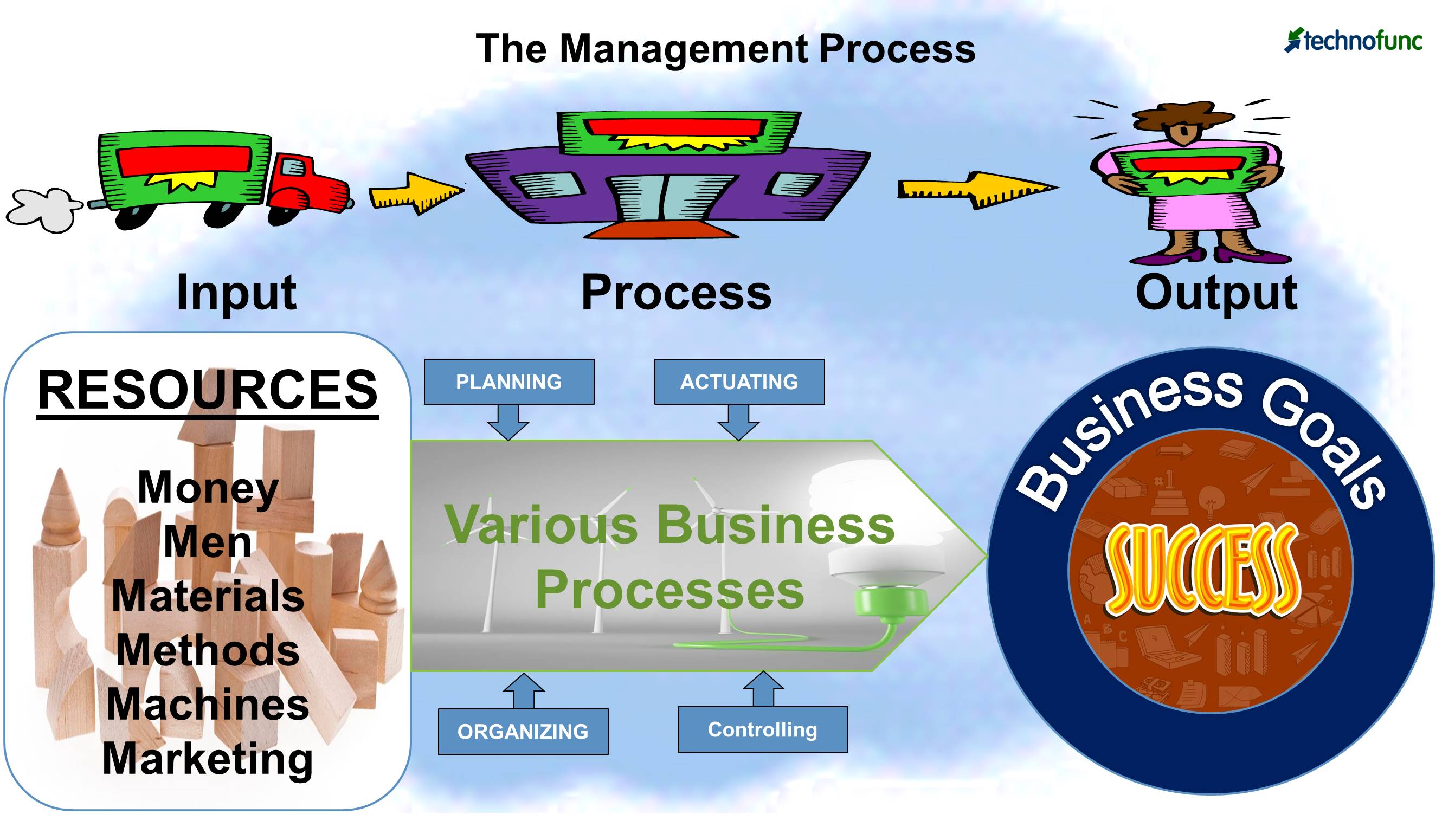- Home
- Business Processes
- Industry Knowledge
- Aerospace Industry
- Automotive Industry
- Banking Domain
- BFSI Industry
- Consumer/ FMCG Industry
- Chemicals Industry
- Engineering & Construction
- Energy Industry
- Education Domain
- Finance Domain
- Hospitality Domain
- Healthcare Industry
- Insurance Domain
- Retail Industry
- Travel and Tourism Domain
- Telecom Industry
- Leadership Skills
- eLearning
- Home
- Leadership
- Leadership Styles
- Concept of Management
Concept of Management
The concept of management refers to the process of planning, organizing, staffing, directing, coordinating, and controlling to achieve organizational goals. It is the management of human, physical, financial, and other valuable resources of the organization in an effective and efficient manner to achieve business objectives.
Different people have conceived and defined management in different ways. But, the essence of management lies in determining worthwhile goals and then carefully selecting and utilizing resources through efficient and effective planning, organizing, actuating, and controlling to achieve those goals.
Who is a Manager?
You are a manager. What does this mean? The word derives from the ancient French word for handling horses and a later one for handling the affairs of the kitchen. Cynics might replace horses with donkey, but all would see the analogy of keeping an organization alive through the activities of the kitchen. Probably the one that is most simple, popular, and often quoted by many in general is "getting things done through other people."
Let us now look at different definitions that highlight important aspects of management.
- Management is a distinct process consisting of activities of planning, organizing, actuating and controlling, performed to determine and to accomplish stated objectives with the use of human beings and other resources (Martin, 1977).
- Good management is merely the exercise of common sense and the Golden Rule (Daniel, 1976)
- The six M’s (money, men, materials, methods, machines, and marketing) of management or the basic resources, as they are often called, are subjected to the fundamental functions of management - planning, organizing, actuating, and controlling -to achieve stated objectives.
- Management is an art struggling to become a science.
- Management science is a body of systematized knowledge accumulated and accepted with reference to the understanding of general truths concerning management.
- The art of management is a personal creative power plus skill in performance. The contemplation of problems, events, and possibilities develops personal creative power, while experience, observation, and study of results contribute to skilled performance. It other words, management art involves envisioning an orderly whole from chaotic parts, communicating the vision, and achieving the goal. It is the "art of arts" because it organizes and uses human talent (Boehringer, 1975)

From these definitions, we can infer that the principles and the techniques of management are not only applicable to the business world but they can be equally applied universally. They also find application in social, religious, charitable, and non-profit organizational contexts.
Essentially we can conclude that management is the integration of human and other resources in a manner that leads to effective utilization and harmonization of the individual efforts with organizational goals.
Suggested Reading and Resources
Related Links
You May Also Like
-
Have you ever resonated that there seem to be as many different ways to lead people as there have been great leaders? When we recall the success of Mahatma Gandhi, Nelson Mandela, Abraham Lincoln, Napoleon Bonaparte to Steve Jobs and Jack Welch, we also notice that they all used different approaches that were suitable to their specific situations and circumstances. Over the last century, researchers and psychologists have developed simple ways to describe the “Styles of leadership” and in this section, we will explore these commonly known leadership styles.
-
In today's business world, proficiency in management skills is essential for career growth and success. Managerial skills can be defined as attributes or abilities that are essential for every leader and manager to succeed and fulfill specific tasks expected from them by the organization.
-
Behavioral Approach to Management
The behavioral management theory had a profound influence on management by focusing on understanding the human dimensions of work. It is also called human relations movement as behavioral theorists focused on managing productivity by understanding factors of worker motivation like their needs and expectations, personality, attitudes, values, group behavior, conflict, and group dynamics. It advocated the use of psychological techniques to motivate employees.
-
Teams are part of the modern organizational culture. Whether you are a team leader or a team member, having a better understanding of how teams work, and being able to identify where the team is in the process, is a critical part of ensuring the team is ultimately successful. Start with the basics and understand what a team is and what role they play in an organization.
-
Leadership has been defined in different ways by different sets of scholars. In very simple terms leadership can be defined as the skill of a person to influence an individual or a group for achievement of a goal in a given situation. One can use different dimensions and perspectives to define leadership. Through the evolution of leadership thought, leadership has been defined in various ways discussed here.
-
Team leadership theory is a recent leadership theory that does not discriminate between the leader and the other team members. The approach considers contributions from each team member to be critical for organizational success. This approach focused on the overall team effectiveness and team problems are diagnosed and action is taken to remediate weakness. This approach provides for taking corrective action when the leader deems necessary.
-
The concept of management refers to the process of planning, organizing, staffing, directing, coordinating, and controlling to achieve organizational goals. It is the management of human, physical, financial, and other valuable resources of the organization in an effective and efficient manner to achieve business objectives.
-
At different points in your professional career, it is helpful to identify your core values. Values are the qualities considered to be the most important guiding principles that determine the priorities in your life and greatly influence your career choices. Your career brings happiness when it is in agreement with the beliefs you have about what is important and meaningful to you. Awareness of your values will help you develop a clearer sense of what's most important to you in life.
-
Management theories are the recommended management strategies that enable us to better understand and approach management. Many management frameworks and guidelines were developed during the last four decades.
-
Quantitative Theory of Management
The quantitative management approach is given by the mathematical school that recommends the use of computers and mathematical techniques to solve complex management issues and assist in the managerial decision-making process. Managers observe historical quantitative relationships and use quantitative techniques such as statistics, information models, and computer simulations to improve their decision making.
Explore Our Free Training Articles or
Sign Up to Start With Our eLearning Courses

About Us
Learning
© 2023 TechnoFunc, All Rights Reserved










